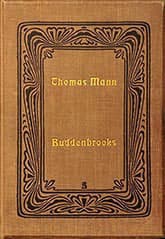Buddenbrooks
Critique • Quotes • Translations
 First edition
First editionSubtitle
The Decline of a Family
Original title
Buddenbrooks: Verfall einer Familie
First publication
1901
First translation into English
1924
Literature form
Novel
Genres
Literary, historical fiction, family saga
Writing language
German
Author's country
Germany
Length
Approx. 243,000 words
No heroes and villains at home
If we have to pick one aspect that might make Buddenbrooks the first important novel of the twentieth century, it could be its moral ambiguity. The story of the Buddenbrook family is told over four generations ending in the latter 1800s, but Thomas Mann's perspective is modern—sympathetic to all, but ironic, detached, passing no judgment on the choices made by the members of the family, letting time heal or hurt at its own pace.
Plenty of drama, but no villains. And no inspiring heroes either.
It is well-known that Mann based the tale on his own well-to-do merchant family. The character thought to be modelled on himself is young Hanno, the artistic son whose death after a short life of not fitting into his family's plans for him to be its saviour from decline finally signals the end of the dynasty.
Each Buddenbrook generation, since the original mercantile founder of the family's wealth, faces increasingly difficult dilemmas of having to choose between personal inclinations on one hand—love, art, pleasure—and family obligations on the other. And increasingly the choice of the latter takes its toll.
Yet Mann is careful not to make the novel an all-out plea for self-fulfilment. If anything the conflict between the personal and the social is presented as an unfortunate characteristic of human beings, the natural order of things.
Even when characters from outside enter the family and wreak small havoc on its status and financial stability, they are depicted not as masterly evil-doers but as weaklings at worst—dangers to be paid off or steered around. The good ship Buddenbrook sails on toward its inevitable end, determined by the contradictions within itself.
But this is for the most part a bloodless progression. The rise and fall of a family history is a working out of competing ideas, under the eyes of an impartial but imperial God. Despite the author's later association with leftist views, in philosophical-political terms Buddenbrooks is more Hegelian than Marxist.
Ambivalent about good and evil
In the period covered, Europe was convulsed by several upheavals and real blood was being shed, but the story of the Buddenbrook family floats above all that, intersecting with it only at one juncture to bring out a particular public aptitude of a Buddenbrook patriarch.
In this sense Mann's ambivalence toward good and evil within his family mirrors his disregard for the greater causes in which they could not help but be situated in real life. Only in his later books do Mann's characters engage the social drama of the age more directly.
One could argue of course that Buddenbrooks is not about politics and should not be judged by that criterion, that not every novel has to be about the social revolutions of its day. I'm not arguing that it should be.
Far from it. Buddenbrooks focuses on the life within the family and in so doing it is an admirably unsentimental, realistic depiction of that life and the quandaries that beset those involved in it. I'm just pointing out that this is not the whole story.
— Eric
Critique • Quotes • Translations

